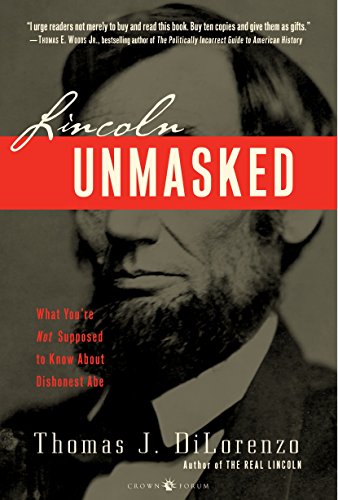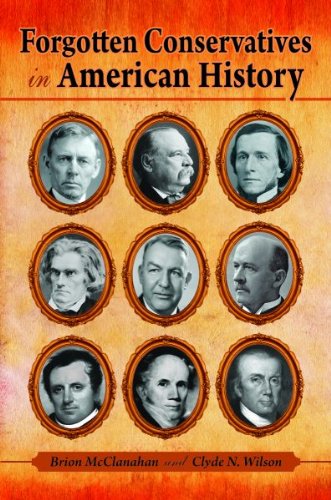In a 2014 summer edition of The Objective Standard that I recently ran across, an article entitled, “Getting Lincoln Right,” caught my eye. Alexander V. Marriott, a professor of history, takes to task those inhabitants of “the depths” of a “neo-Confederate intellectual backwater”—like economist and staunch Lincoln critic, Thomas DiLorenzo—that engage in, not just “Lincoln revisionism,” but “severe” Lincoln revisionism.
Marriot identifies four charges against Lincoln that he is certain deserve to be “put to rest.” But because the chief among them is the allegation that our 16th president “eviscerated the right of secession supposedly at the heart of the American Revolution,” it is to this claim alone that I will speak.
Before proceeding, let the reader note that I am not a historian. Philosophy is my trade. Yet given the unmistakably, if not always overtly, polemical character of much of the contemporary literature on Lincoln—like Marriot’s essay—it’s painfully clear that however it’s packaged, genuinely historical considerations are noted for their conspicuous absence.
 A Disease in the Publi...
Best Price: $5.84
Buy New $11.14
(as of 05:25 UTC - Details)
A Disease in the Publi...
Best Price: $5.84
Buy New $11.14
(as of 05:25 UTC - Details)
This, however, doesn’t mean that writers involved in this debate over Lincoln’s legacy are insincere. It doesn’t even mean that what they say isn’t true. What it does mean, though, is that inasmuch as an author—even when he describes his scholarship as “historical”—exploits the past in order to service a contemporary political or ideological agenda, his work is not historical. It is, rather, a species of “retrospective politics,” as the philosopher Michael Oakeshott referred to this enterprise.
In any event, in what follows I offer my own non-historical analysis of the key question regarding whether Southern states—and by implication, any states—have a “right to secession.” The difference here, though, is that while my analysis is political, it is political-philosophical: Far from seeking to promote a political creed or program, my objective is to examine the logic of some the central concepts of this debate.
By the time this inquiry reaches its terminus—and quite possibly well before that—it should be obvious that a state must have a “right to secession.”
 The Real Lincoln: A Ne...
Best Price: $4.25
Buy New $7.48
(as of 07:05 UTC - Details)
The Real Lincoln: A Ne...
Best Price: $4.25
Buy New $7.48
(as of 07:05 UTC - Details)
Marriot describes as “ludicrous” Thomas DiLorenzo’s assertion that “the right of secession” is at the heart of the American founding. “The Declaration of Independence,” he says, affirmed not a right to secession, but “the natural right to revolution, to alter or abolish a government that has become destructive of the ends for which it was created—to secure unalienable individual rights.”
For Marriot, this proves that, according to the vision of the Founders, “only individuals have rights” (emphasis original).
For our purposes, it is irrelevant whether Marriot is correct about what the Founders envisioned. Our task is to interrogate the concepts of “state” and “individual rights” that he invokes here to determine whether the vision that he attributes to the Founders is coherent.
Take, for starters, the concept of a state.
From the advent of the modern era some 500 years ago, the concept of a state has figured at least as prominently in the ethical/political universe of Western peoples as has that of the individual. But what is “a state?”
 Lincoln Unmasked: What...
Best Price: $5.95
Buy New $9.85
(as of 07:10 UTC - Details)
Lincoln Unmasked: What...
Best Price: $5.95
Buy New $9.85
(as of 07:10 UTC - Details)
A state is a specific mode of human association distinguished on account of the associates’ shared recognition of the authority of the law that unites them as citizens. Encompassing an identifiable territorial jurisdiction and constituted by the totality of the activities—of which the activity of governing is but one among countless others—that transpire within that expanse, it is a self-sufficient or autonomous entity.
The logic of the concept of a state demands its sovereignty. In other words, a “sovereign state” is a meaningless expression because it is a redundant one: states, by definition, are sovereign.
If an agent, whether an individual or a state, is a sovereign being, this means that it has authority over itself. If it has authority over itself, this then means that it has “the right” to govern itself in any and all ways that don’t violate the right of other sovereign beings to do the same.
The “right to secession”—the right of a sovereign agent of a kind, a state, to relate to other sovereign agents of its kind in any manner that it deems appropriate consistent with respect for the same right of others to do the same—is nothing more or less than “freedom of association.” A state, then, without the right to secession is a state without the freedom to associate with—and, hence, dissociate from—those of its choosing.
 3X5 Fort Moultrie Libe...
Buy New $2.98
(as of 11:55 UTC - Details)
3X5 Fort Moultrie Libe...
Buy New $2.98
(as of 11:55 UTC - Details)
But a state without the right to freedom of association is a contradiction in terms.
Simply put, if, as Marriot would have us believe, the Founders did not concede the states’ right to secession, then we must conclude that they denied that states have any rights, for the right to secession—freedom of association—is the most basic of all rights that a sovereign actor has: without this right, there can be no others.
And if the Founders denied that states possessed rights, then they denied the very existence of the individual states.
If Marriott is correct, then, the Founders denied that the ontological metamorphosis from colony to state that the American Revolution was supposed to have affected ever occurred. All that had changed is that the colonists of each colony had traded in one set of rulers to whom they were beholden, those in the national government of England, for those in the national government of America that they were in the process of creating—or, to use the euphemism of which Marriott is particularly fond, “the people.”
Next, let’s take the concept of “individual rights.”
 Against the State: An ...
Best Price: $5.02
Buy New $5.52
(as of 11:35 UTC - Details)
Against the State: An ...
Best Price: $5.02
Buy New $5.52
(as of 11:35 UTC - Details)
Marriott’s insinuation that that the Founders’ talk of the rights of individuals precludes their support of the rights of states is almost scandalously disingenuous, as disingenuous as the dichotomous terms in which, among others, Lincoln framed the relationship between “human rights” and “property rights.” There are two reasons for this.
First, a state is nothing without its inhabitants. It is its inhabitants. Thus, the assertion of a state’s right to secession is the assertion of the individuals or the people within that state’s borders to go their separate way. It is the assertion of their freedom to associate or not with others.
So, if the states have no right to secession, then neither does the individual have any rights. To reiterate the point made earlier, unless the individual has the freedom to associate or not with those of his choosing, the individual has no rights.
Second, the rights of individuals, it was always understood, were secured precisely by the wide dispersal—the decentralization—of power and authority that the Constitution established. Yet decentralization can occur only if the idea of a national government is rejected in favor of that of a federal government—a government with “limited” authority. Limited, though, by what? The concept of a self-limiting “federal” government, any simpleton can see, is self-contradictory. Thus, the logic of the concepts of “decentralization” and a “federal government” necessarily imply the existence of other actors—sovereign actors, entities with the authority to circumscribe that of the federal government.
 FORGOTTEN CONSERVATIVE...
Buy New $15.98
(as of 09:00 UTC - Details)
FORGOTTEN CONSERVATIVE...
Buy New $15.98
(as of 09:00 UTC - Details)
In the case of the Constitution, those sovereigns that promise to prevent the federal government from degenerating into a national one by limiting its authority and power are the individual states.
Thus, once more, we are back to the same verdict: the states must have the right to secession, for this right to freedom of association is the most fundamental of all rights: without it, there are no others.
Marriot insists that the Southern states sought to secede from the Union for the most “heinous” of reasons: Southerners wanted to preserve the institution of slavery. Setting aside the plethora of challenges facing this incorrigibly reductionistic account of what must be the most complex issue in the life of our nation, we are nevertheless left asking: And so what?
Clearly, those, like Marriot, who repeatedly reduce the tangle of reasons that Southerners supplied for seceding to a villainous desire to oppress blacks mean to suggest that this was an illegitimate ground for secession. But if states, or, more appropriately, the people within those states, must justify themselves to others beyond their borders before they can be said to have the authority to secede, then this is the test that they must pass before they can be said to possess the authority to do anything else.
Once more, this means that borders are mere lines on a map and there are no states.
There is, however, another difficulty with the tireless invocation of slavery for which the Marriots of the world are known.
If neither the Southern states nor any states had a right of secession, as Marriot, like most of those invested in “getting Lincoln right,” steadfastly maintain, then whether the reasons for wanting to secede are “heinous” or angelic, evil or noble, are utterly irrelevant. Whether secessionists are motivated by a shared desire to oppress others or an equally aching desire to escape the oppression of a tyrannical national government, the object of their desire is an illegality: they have no right to secede.
A philosophical analysis of the concepts of “state,” “individual rights,” and such concomitant ideas as “sovereignty” and a “federal government,” establishes that those living within the Southern states, like those living within any state, must always retain a right to secession, the freedom to associate with or dissociate from others. This is the thesis for which I’ve argued.
In other words, whether Marriot is right and the Founders never countenanced, even in theory, a state’s right to secede from the Union—a claim, frankly, that I find patently absurd on its face—the erection of free and independent states to which the War of Independence gave rise necessarily implies the right of secession.






